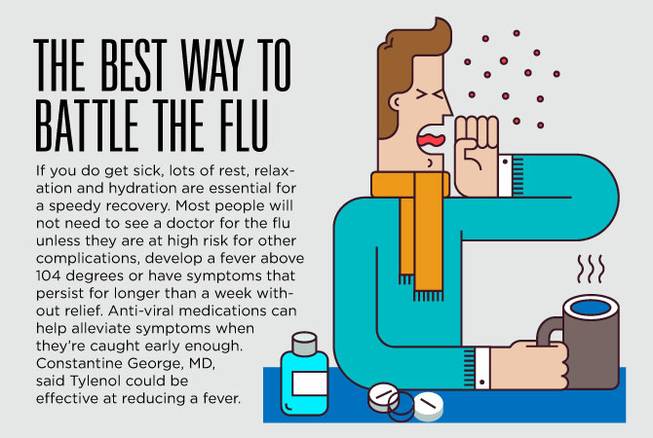
Monday, Oct. 10, 2016 | 2 a.m.
Every fall, the Centers for Disease Control and Prevention recommends that anyone getting the flu shot should do so by the end of October.
“The activity of the flu virus starts in October and can last through the end of May. Influenza rates tend to rise significantly during the months of December to early March,” said Constantine George, MD, at Hygeia Health and Wellness clinic and Southern Hills Hospital & Medical Center.
While most of us are familiar with the flu, every year the virus is different and causes varying levels of epidemic severity. This is what you need to know about the 2016-’17 flu season.
Flu vs. the common cold
The flu and the cold both are viral, respiratory illnesses with similar symptoms, which can make the two difficult to distinguish. In general, the flu tends to be more severe and is more often associated with serious complications such as pneumonia.
It’s a common misconception that the flu always involves the onset of a fever, whereas a cold does not. Both the flu and a cold can cause a fever, but it tends to be more common with the flu. Still, not everyone with influenza will develop a fever.
Symptoms of the flu
Depending on the particular strain of the flu virus, some symptoms may be more or less severe. But these are the main symptoms you can expect: fever, chills, fatigue, stuffy/runny nose, body aches, headaches, sore throat, diarrhea and/or vomiting.
Flu complications
Complications can stem from the flu, including pneumonia, encephalitis (a brain infection), myocarditis (inflammation of the heart) and myositis (inflammation of the muscles).
These complications are generally uncommon for most healthy adults, but infants and children, the elderly, pregnant women and people with pre-existing medical conditions are most vulnerable to serious complications. “Those with congestive heart failure, diabetes and/or asthma are especially at risk for flu-related complications,” George said.
There are a few warning signs that may indicate a flu-related complication. These include:
1. Shortness of breath/difficulty breathing
2. Confusion
3. Chest pain or pressure
4. Inability to eat or loss of appetite
5. Severe vomiting
Treatment and prevention
While there’s no “cure” for the flu, there are ways to help prevent contracting it. “Prevention really is the key with the flu,” George said. Following these prevention methods, for yourself and others, is important during flu season:
1. Get a yearly flu vaccine
2. Wash your hands regularly
3. Cover your nose and mouth when coughing and sneezing
4. Avoid others who may be sick
5. Stay home from work/school/other obligations if you are sick
Information about the flu vaccine
The flu vaccine can help prevent a person from getting the flu, lessen the severity of the symptoms for those who do get the flu and lessen the likelihood of developing flu-related complications. It takes about two weeks prior to receiving the vaccination for the protection to set in, so it’s important that people get vaccinated early in the season.
The CDC recommends that everyone over the age of 6 months should get the flu vaccine unless they have allergies to anything in the vaccine, including egg allergies. Anyone with a relevant allergy should speak with their physician about alternatives.
The CDC also issued a warning against using the nasal spray flu vaccine during the 2016-’17 flu season over concerns about its efficacy. Anyone getting a flu vaccine this year should opt for an injectable shot instead of the nasal spray.
If you do get sick...
Lots of rest, relaxation and hydration are essential for a speedy recovery.
Most people will not need to see a doctor for the flu unless they are at high risk for other complications, develop a fever above 104 degrees or have symptoms that persist for longer than a week without relief.
Anti-viral medications can help alleviate symptoms when they’re caught early enough. George said Tylenol could be effective at reducing a fever.

Join the Discussion:
Check this out for a full explanation of our conversion to the LiveFyre commenting system and instructions on how to sign up for an account.
Full comments policy